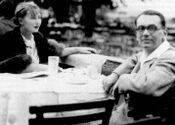Template:Are You Sure/April 28: Difference between revisions
(Created page with "• ... that mathematician '''Leopold Kronecker''' (1823–1891) was quoted by Heinrich Martin Weber (1893) as having said, "Die ganzen Zahl...") |
No edit summary |
||
| (35 intermediate revisions by the same user not shown) | |||
| Line 1: | Line 1: | ||
• ... that mathematician '''[[Leopold Kronecker (nonfiction)|Leopold Kronecker]]''' (1823–1891) was quoted by Heinrich Martin Weber (1893) | [[File:Adele and Kurt (cropped).jpg|thumb|175px|link=Kurt Gödel (nonfiction)|[[Kurt Gödel (nonfiction)|Adele Porkert and Kurt Gödel]] in Vienna during their courtship (mid-1930s).<br><br>The text under the [[:File:Adele and Kurt.jpg|complete photograph]] reads:<br>"Adele Porkert and Gödel were an unlikely but devoted couple. This photograph, taken at an outdoor Viennese cafe, is from the period of their long courtship. Porkert shielded Gödel from the worst of his irrational fears, and was often the only person who could persuade him to eat. More than anyone else, she was responsible for keeping him alive and productive."<br><br>After his wife's hospitalization in 1977, Gödel stopped eating and starved to death.]] | ||
• ... that logician, mathematician, and analytic philosopher '''[[Kurt Gödel (nonfiction)|Kurt Gödel]]''' (1906–1978) shocked his colleagues with his [[Gödel's incompleteness theorems|incompleteness theorems]], which use [[Mathematical logic (nonfiction)|mathematical logic]] itself to prove that mathematical logic (which might be thought of as the science of being certain) is inherently subject to uncertainty; that Gödel's work shook mathematics to its [[Foundations of mathematics (nonfiction)|foundations]], establishing fundamental principles of modern thought; and that Gödel suffered periods of mental instability and illness, with an obsessive fear of being poisoned, eventually eating only food that his wife, Adele, prepared for him; and that after her hospitalization in 1977, when she could no longer prepare her husband's meals, he starved to death? | |||
• ... that physicist and engineer '''[[Rolf Landauer (nonfiction)|Rolf Landauer]]''' (1927–1999) made important contributions to the thermodynamics of information processing, including the principle that in any logically irreversible operation that manipulates information, such as erasing a bit of memory, [[Entropy (nonfiction)|entropy]] increases and an associated amount of energy is dissipated as heat, a phenomenon now known as [[Landauer's principle (nonfiction)|Landauer's principle]]? | |||
• ... that '''[[Geometrical frustration (nonfiction)|geometrical frustration]]''' (or simply '''frustration''') is a phenomenon in condensed matter physics where atoms tend to stick to non-trivial positions or where, on a regular crystal lattice, conflicting inter-atomic forces (each one favoring rather simple, but different structures) lead to quite complex structures, and that as a consequence of the frustration in the geometry or in the forces, a plenitude of distinct [[Ground state (nonfiction)|ground states]] may result at zero temperature, and usual thermal ordering may be suppressed at higher temperatures? | |||
• ... that mathematician '''[[Leopold Kronecker (nonfiction)|Leopold Kronecker]]''' (1823–1891) was quoted by [[Heinrich Martin Weber (nonfiction)|Heinrich Martin Weber]] (1893): "Die ganzen Zahlen hat der liebe Gott gemacht, alles andere ist Menschenwerk" ("God made the [[Integer (nonfiction)|integers]], all else is the work of man")? | |||
{{Template:Categories: April 28}} | |||
Latest revision as of 22:16, 24 April 2024

The text under the complete photograph reads:
"Adele Porkert and Gödel were an unlikely but devoted couple. This photograph, taken at an outdoor Viennese cafe, is from the period of their long courtship. Porkert shielded Gödel from the worst of his irrational fears, and was often the only person who could persuade him to eat. More than anyone else, she was responsible for keeping him alive and productive."
After his wife's hospitalization in 1977, Gödel stopped eating and starved to death.
• ... that logician, mathematician, and analytic philosopher Kurt Gödel (1906–1978) shocked his colleagues with his incompleteness theorems, which use mathematical logic itself to prove that mathematical logic (which might be thought of as the science of being certain) is inherently subject to uncertainty; that Gödel's work shook mathematics to its foundations, establishing fundamental principles of modern thought; and that Gödel suffered periods of mental instability and illness, with an obsessive fear of being poisoned, eventually eating only food that his wife, Adele, prepared for him; and that after her hospitalization in 1977, when she could no longer prepare her husband's meals, he starved to death?
• ... that physicist and engineer Rolf Landauer (1927–1999) made important contributions to the thermodynamics of information processing, including the principle that in any logically irreversible operation that manipulates information, such as erasing a bit of memory, entropy increases and an associated amount of energy is dissipated as heat, a phenomenon now known as Landauer's principle?
• ... that geometrical frustration (or simply frustration) is a phenomenon in condensed matter physics where atoms tend to stick to non-trivial positions or where, on a regular crystal lattice, conflicting inter-atomic forces (each one favoring rather simple, but different structures) lead to quite complex structures, and that as a consequence of the frustration in the geometry or in the forces, a plenitude of distinct ground states may result at zero temperature, and usual thermal ordering may be suppressed at higher temperatures?
• ... that mathematician Leopold Kronecker (1823–1891) was quoted by Heinrich Martin Weber (1893): "Die ganzen Zahlen hat der liebe Gott gemacht, alles andere ist Menschenwerk" ("God made the integers, all else is the work of man")?